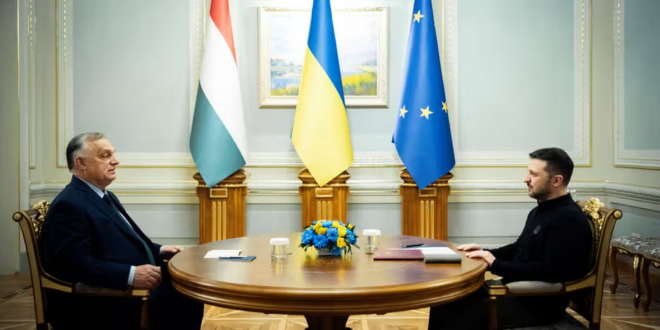Hungarian PM, an outspoken critic of aid to Ukraine, makes first trip to country since start of Russia’s full-scale invasion
Hungary’s prime minister, an outspoken critic of western aid to Ukraine, has held talks with President Volodomyr Zelenskiy in Kyiv, following a surprise visit by Europe’s most pro-Russian leader to the Ukrainian capital.
The trip by Viktor Orbán came a day after Hungary took over the rotating EU presidency until the end of the year, to the dismay of many other European politicians, given the country’s frequent clashes with Brussels over domestic rule-of-law issues and foreign policy.
“The aim of the Hungarian presidency is to contribute to solving the challenges ahead of the European Union. That’s why my first trip was to Kyiv,” Orbán wrote on Facebook under a photograph of him shaking hands with Zelenskiy.
At a joint media briefing, Zelenskiy said Tuesday’s discussions between the two leaders in Kyiv could serve as a basis for a future agreement between Ukraine and Hungary.
Orbán, in turn, said he asked his Ukrainian counterpart to consider a quick ceasefire that could accelerate peace talks. Zelenskiy, who spoke before Orbán, did not respond to those comments.
Orbán’s visit, his first to Ukraine in a decade, was a rare gesture in a relationship that has long been marred by tensions.
Hungary has been at odds with other Nato countries over Orbán’s continued cultivation of close ties to Russia and refusal to send arms to Ukraine, with Budapest’s foreign minister in May calling plans to help the war-torn country a “crazy mission”.
The Kremlin downplayed Orbán’s visit to Kyiv, stating on Tuesday it did not “expect anything” from the trip.
A Kremlin spokesperson, Dmitry Peskov, said the Hungarian leader was merely “fulfilling his duties” as part of the country’s presidency of the EU. He added that Moscow was not in contact with Budapest before Orbán’s trip. Peskov commended the Hungarian leader as “a politician who strongly defends his country’s interests”.
Budapest has kept channels open with Moscow, and Orbán’s foreign minister, Péter Szijjártó, has made at least five trips to Russia since the start of the war, most recently to visit an economic forum in St Petersburg last month.
Hungary said last month it would not block Nato decisions on providing support for Ukraine as long as Budapest was not involved in the aid.
Orbán, a self-described “illiberal” leader, also recently endorsed Mark Rutte to become the next head of Nato with the assurance that Hungary’s forces and financial resources would not be committed to supporting Ukraine.
A source in Budapest with knowledge of the matter said Orbán’s plan to visit Kyiv came together after lengthy negotiations on the issue of rights for Ukraine’s Hungarian-speaking minority, who live in the far west of Ukraine close to the two countries’ border.“It was a precondition for the meeting that the issue of nationality rights was resolved. In recent weeks, an agreement has been reached. They will be able to announce this as a success,” said the source.
While nationality rights have been one of Budapest’s most vocal complaints when it comes to Ukraine, critics of Orbán have accused him of using the issue as a smokescreen to facilitate the promotion of Russian talking points over the conflict.
Zelenskiy and Orbán have clashed numerous times since the start of the full-scale invasion.
Orbán included Zelenskiy in a list of “opponents” who had supposedly conspired against him and backed the opposition, while the Ukrainian president personally called out the Hungarian leader for his lack of support to Kyiv in the days after Russia’s invasion.
The two leaders were last seen having an animated exchange at the European Council summit in Brussels on 27 June.
 Eurasia Press & News
Eurasia Press & News




